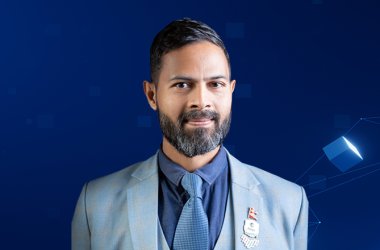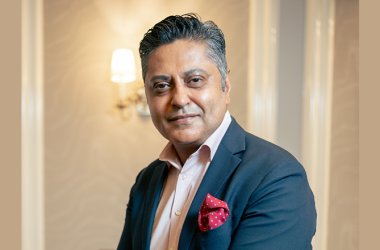![]()
Petra Schirren, President for Gulf at Ericsson Europe, Middle East and Africa, addresses the company’s support for national digital economy agendas such as ‘We the UAE 2031’ and their use of logistical insights from mobility reports to enable ecosystem co-creation across the region.
How do you see your organisation contributing to the region’s bold and ambitious national digital economy agendas and where do you believe private–public collaboration will be most critical in achieving these ambitions?
At Ericsson, we actively support the Middle East’s ambitious digital economy agendas by partnering with governments and telecom operators to modernise digital infrastructure and foster innovation. In the UAE, our collaboration with national efforts such as the “We the UAE 2031” agenda focuses on building advanced 5G networks, enabling smart cities and developing digital public services. Initiatives like the Gen-E Graduate Program and Excelerate&, in partnership with e&, underscore Ericsson’s commitment to nurturing a highly skilled digital workforce with training in 5G, AI, and cloud computing.
According to the Ericsson Mobility Report the region is projected to reach over 90% 5G penetration by 2030, positioning the Gulf as one of the most advanced 5G markets globally — a key enabler for digital transformation and economic diversification[1].
Public–private collaboration is essential for achieving these bold ambitions. Ericsson plays a pivotal role in co-developing frameworks for progressive spectrum policies, piloting AI-powered innovations and advancing sustainable and resilient infrastructure. By fostering joint innovation centres and aligning national strategies, Ericsson empowers the region to become a global technology hub, driving transformative growth across sectors such as smart mobility, e-health, and IoT solutions.
As emerging technologies such as Gen AI and Agentic AI continue to reshape industries, how do you strike the right balance between rapid adoption for competitive advantage and ensuring resilience, security and regulatory alignment?
Ericsson recognises the transformative potential of GenAI and Agentic AI in reshaping industries while emphasising a balanced approach to adoption. We work closely with governments and telecom operators to align with digital economy strategies like the UAE Vision 2031, Oman’s Vision 2040, modernising infrastructure and enhancing regulatory frameworks to support innovation responsibly.
To ensure resilience and security, Ericsson co-develops open, investment-friendly spectrum policies and prioritises sustainable network development. Our R&D investment focuses on AI-driven networks designed to enhance performance while adhering to stringent data privacy and cybersecurity standards.
Lastly, we actively invest in local talent development through graduate programs, STEM education and tech academies, emphasising digital upskill to drive a knowledge-based economy. By integrating innovation with regulatory alignment, Ericsson empowers businesses to leverage AI’s competitive advantages and ensures transformative technologies are deployed securely and ethically for long-term sustainability.
What role do you believe technology leadership should play in redefining business models and creating new value ecosystems across the Middle East?
Technology leadership is fundamental to redefining business models and creating interconnected value ecosystems across the Middle East. At Ericsson, we believe leadership extends beyond connectivity, enabling telecom operators to unlock new revenue streams through network APIs, digital platforms and tailored solutions for verticals like logistics, smart manufacturing and financial services.
Ericsson champions open innovation by fostering collaborations with startups, academia and governments to develop scalable solutions that align with regional economic goals. By leveraging 5G and AI, we empower operators to transition into full-scale tech companies capable of delivering transformative cross-sector solutions, from private networks to IoT and digital healthcare.
The Ericsson Mobility Report reinforces this leadership opportunity, with the region expected to achieve over 86 million 5G subscriptions by 2030, driving exponential growth in enterprise and industrial digitalisation[2].
Our focus on enabling ecosystem co-creation goes hand in hand with shaping policies supportive of innovation and investment. Through technology leadership, Ericsson aims to drive disruptive innovation, enhance customer value and ensure the Middle East remains a global frontrunner in digital transformation.
Looking ahead, which transformative technologies do you believe will define the region’s global standing over the next decade; and how are you preparing your organisation to lead in that shift?
Ericsson identifies 5G Advanced, generative AI, specialised IoT solutions and mission-critical networks as the transformative technologies that will shape the Middle East’s global competitiveness over the next decade. These advancements will drive productivity gains and unlock innovative business models critical to the region’s economic growth.
To lead this shift, Ericsson is advancing R&D in 6G and 5G Advanced in collaboration with regional partners like e&, while accelerating the rollout of sustainable network technologies that reduce energy consumption by up to 40%.
Internally, Ericsson is investing in workforce skill development, automation and cloud-native architectures to lead the convergence of emerging technologies. By preparing operators and industries for an increasingly digital and interconnected future and to deliver differentiated connectivity, Ericsson ensures the Middle East is equipped to excel in a competitive global landscape while fostering sustainable, tech-driven growth.
[1] https://www.ericsson.com/49e9b6/assets/local/reports-papers/mobility-report/documents/2025/ericsson-mobility-report-june-2025.pdf
[2] https://www.ericsson.com/49e9b6/assets/local/reports-papers/mobility-report/documents/2025/ericsson-mobility-report-june-2025.pdf
Image Credit: Ericsson





